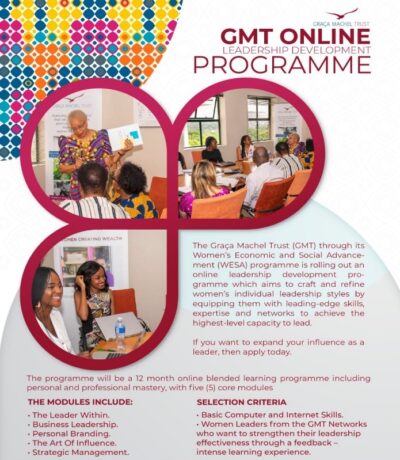
iStock Image
The Graça Machel Trust’s (GMT) Women Economic and Social Advancement (WESA) has launched a 12-month Online leadership development programme targeting women leaders who run networks across seven Women’s Business Country Chapter Networks. The question the programme seeks to address is “What is the leadership profile that drives thriving, successful network?” Launched, in May 2021, the programme enhances and integrates components from the Trust’s Women Will Lead (WILL) programme designed by Expert-tech for the Women in Media Network in 2017. Following the footsteps of GMT’s Founder, Mrs Machel, a stateswoman, and a global human rights leader and activist, the programme calls on women to take on the leadership roles in different economic spheres. Mrs Machel has committed her life to ensuring doors are open for more women to become active and equal participants in economies, and representatives in key decision-making platforms that challenge the status quo and present alternative voices in how our society, particularly economies, are led and governed.
GMT’s value proposition lies within its movement building strategy; convening and connecting women across the continent to build networks to mobilise women and harness their potential as a collective to address women-specific economic and social concerns and be key partners in driving the inclusive growth agenda. Our networks bring women together across a variety of sectors from agribusiness, finance, media and beneficiaries of our postgraduate scholarship programme.
The record of women in business and public office where key decisions are made about society is low worldwide and while we know the tide is changing, it is not changing fast enough. It is said ‘power is taken and not given’ and while many women will have to liberate themselves before more progressive laws reach them. It is also the existential crisis upon us that opens up a great opportunity for the more nurturing feminine energy and power to emerge and women can play a significant role in this regard in leading or contributing to this transformation of our world. It will take commitment, courage and hard work for a dedicated group of women to be a part changing the status quo.
McKinsey’s ‘Women Matter’ report from 20161, builds the case for increased representation of women in top management positions and explores concrete ways to change attitudes towards women in the workplace. It asserts that this could add as much as USD 12 trillion, or 11% to global GDP by 2025. They further found that a diversity of leadership styles can contribute to more effective decision-making, and that the leadership behaviours women typically display can have a positive impact on many dimensions of an organisation’s performance and health. The report asserts further, that beyond gender diversity, it is the diversity of leadership styles that improves performance, and companies that have been successful in retaining talented women are significantly better at retaining talented men as well.
It is with this background that we aim to centralise leadership development in our women’s economic and social advancement programme at the Trust.
GMT and Women’s Leadership Development

The Graça Machel Trust’s (GMT) Women Economic and Social Advancement (WESA) has launched a 12-month Online leadership development programme targeting women leaders who run networks across seven Women’s Business Country Chapter Networks.
GMT began the Graça Machel postgraduate scholarships (Masters and PhD) programme to further the skills and enable women to lead in underrepresented sectors such as engineering, academia, and other male dominated sectors. By 2017, GMT had supported 100 alumni graduates from its scholarship programme. In the same year, we conducted a survey including interviews to assess how many among the graduates had used qualifications to advance and take up senior leadership positions. The result indicated 55% had managed to get to middle management but no further. They cited several personal limitations and gender biases that have hindered them from moving into more senior/executive leadership positions that their technical/scholarly qualification did not prepare them. The issues raised in the interviews highlighted the need for specific leadership training to help them increase their resilience, improve communication, negotiation and networking capabilities as well as overcoming limiting beliefs and gender biases. They also need skills to better manage their time, domestic pressures and work.
Based on the survey results GMT in 2018 went on to begin its Leadership Development Programme for some of the graduates in partnership with the Women Will Lead (WILL) designed by Hannalie Barão and team from Experttech. The Women in Media Network (WIMN) network followed suit and went through a short version of the Will programme. The WILL programme aims to craft and refine women’s individual leadership styles by equipping them with leading-edge skills, expertise and networks to achieve the highest-level capacity to lead. Women’s values are life-giving and life-affirming, creating possibilities and having the capacity to nurture and empower people, situations, organisations and communities.
The leadership programme aims to prepare and support more women who are leading economic and social change to build the courage, confidence, commitment, resilience, optimism and dare to bring their intrinsic feminine wisdoms and talents to help make more inclusive and harmonious decisions and choices in business, government and civil society organisations.
The Online Leadership programme is a 12-month training intervention, designed in two parts (personal and professional mastery), augmented by coaching sessions. Participants are encouraged, poised and to be ready to challenge themselves out of their comfort zones in order to reach that ‘next level’. It offers a blended approach that includes synchronous, self-directed and self-paced learning training events. Facilitator and participants meet virtually at a set day and time via video conferencing platform.
The programme will build a critical mass of women who have the capabilities and influence to drive and champion institutional transformation to address barriers that impede women’s economic advancement. Identifying the leadership profile’s baseline that harnesses this transformation becomes GMT’s cornerstone to developing women’s leadership capacity to drive networks in a complex adaptative and post Covid-19 economy.
The GMT online programme aims to craft and refine women’s individual leadership styles by equipping them with leading-edge skills, expertise and networks to achieve the highest-level capacity to lead. What make this leadership development programme unique is that participants will co-design their own leadership competency framework that supports the environments they lead to drive economic and social change.
This article was authored by Tambudzai Ndoro, the Programme Manager of Women’s Economic and Social Advancement (WESA) at Graça Machel Trust.










 The Trust supports and mobilises civil society networks on issues of ending child marriage, ending violence against children, ending female genital mutilation and promoting children’s rights, to carry out advocacy and action across Africa. Special focus is placed on Malawi, Mozambique, Tanzania and Zambia where child marriage continues to be a problem largely driven by poverty, gender inequality, harmful traditional practices, conflict, low levels of literacy, limited opportunities for girls and weak or non-existent protective and preventive legal frameworks.
The Trust supports and mobilises civil society networks on issues of ending child marriage, ending violence against children, ending female genital mutilation and promoting children’s rights, to carry out advocacy and action across Africa. Special focus is placed on Malawi, Mozambique, Tanzania and Zambia where child marriage continues to be a problem largely driven by poverty, gender inequality, harmful traditional practices, conflict, low levels of literacy, limited opportunities for girls and weak or non-existent protective and preventive legal frameworks.




 Education is a fundamental right for all children, which is also a vehicle for social, economic and political transformation in communities, countries and the African continent at large. Recent studies indicate a lack of progress in some of the critical commitments aimed at improving education quality, access, retention and achievement, particularly for girls. In most African countries, girls may face barriers to learning, especially when they reach post-primary levels of education. By implementing multi-dimensional approaches to education which includes core education, personal development, life skills and economic competencies, the Trust partners with funding partners, governments, civil societies and the private sector to improve education access.
Education is a fundamental right for all children, which is also a vehicle for social, economic and political transformation in communities, countries and the African continent at large. Recent studies indicate a lack of progress in some of the critical commitments aimed at improving education quality, access, retention and achievement, particularly for girls. In most African countries, girls may face barriers to learning, especially when they reach post-primary levels of education. By implementing multi-dimensional approaches to education which includes core education, personal development, life skills and economic competencies, the Trust partners with funding partners, governments, civil societies and the private sector to improve education access.

 The Nutrition and Reproductive, Maternal, New-born, Child and Adolescent Health and Nutrition, (RMNCAH+N) of the Children’s Rights and Development Programme aims at promoting the Global Strategy for women, children and adolescents’ health within the Sustainable Development Goals (SDG) agenda. The strategy emphasises on the importance of effective country leadership as a common factor across countries making progress in improving the health of women, children and adolescents.
The Nutrition and Reproductive, Maternal, New-born, Child and Adolescent Health and Nutrition, (RMNCAH+N) of the Children’s Rights and Development Programme aims at promoting the Global Strategy for women, children and adolescents’ health within the Sustainable Development Goals (SDG) agenda. The strategy emphasises on the importance of effective country leadership as a common factor across countries making progress in improving the health of women, children and adolescents. Through its Early Childhood Development (ECD) plan, The Trust will seek to put into action the new science and evidence Report that was presented by Lancet Series on Good and early development – the right of every child. This will be achieved by mobilising like-minded partners to contribute in the new science and evidence to reach all young children with ECD. The Trust’s goal is to be a catalyst for doing things differently, in particular, to rid fragmentation and lack of coordination across ECD sectors. In response to evidence showing the importance of political will in turning the tide against the current poor access and quality of ECD. Even before conception, starting with a mother’s health and social economic conditions, the early years of a child’s life form a fundamental foundation that determines whether a child will survive and thrive optimally.
Through its Early Childhood Development (ECD) plan, The Trust will seek to put into action the new science and evidence Report that was presented by Lancet Series on Good and early development – the right of every child. This will be achieved by mobilising like-minded partners to contribute in the new science and evidence to reach all young children with ECD. The Trust’s goal is to be a catalyst for doing things differently, in particular, to rid fragmentation and lack of coordination across ECD sectors. In response to evidence showing the importance of political will in turning the tide against the current poor access and quality of ECD. Even before conception, starting with a mother’s health and social economic conditions, the early years of a child’s life form a fundamental foundation that determines whether a child will survive and thrive optimally.